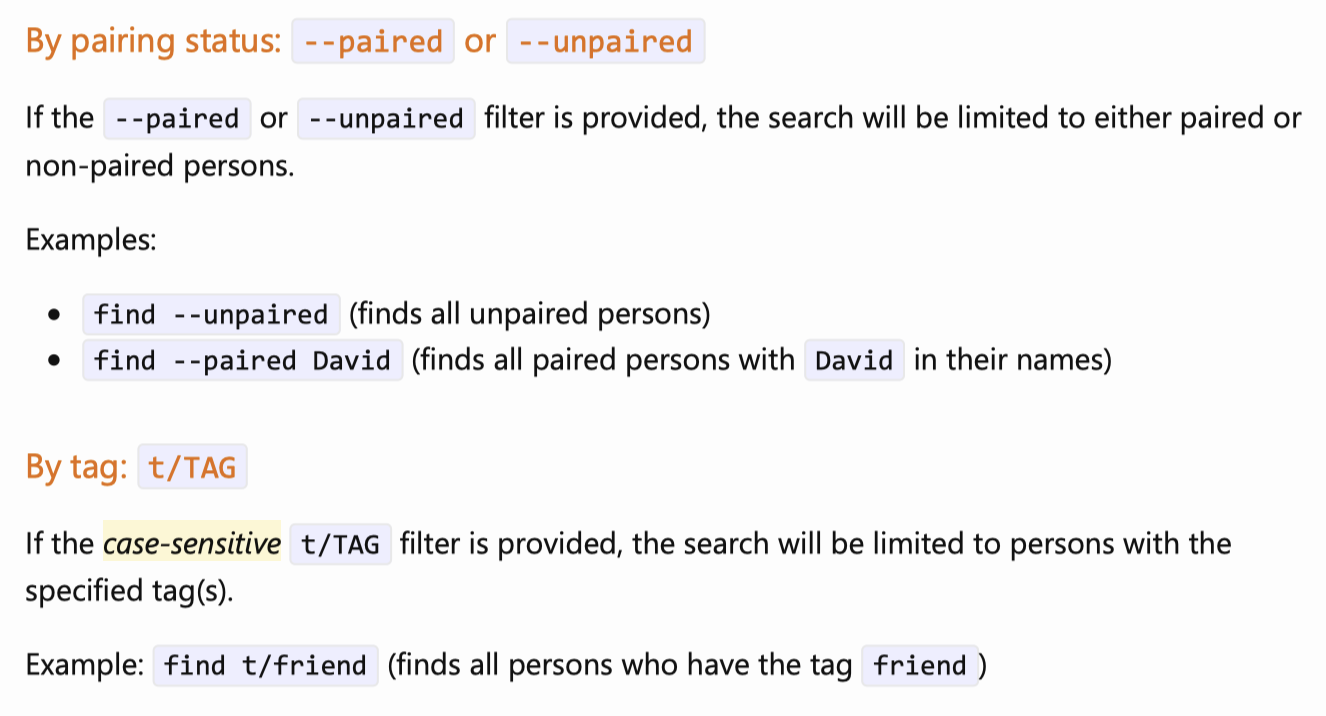Team's Response
Firstly, I would like to address the statement:
The application currently treats paired and unpaired as case-sensitive, which does not align with the real-world behavior of these entities.
The --paired and --unpaired filters are flags, which are used in CLI-based shells. And flags are case sensitive. See: [1] [2] [3] [4]. Hence, these flags do indeed align with the real-world behavior of these entities, which is relevant and understandable as computing students who regularly interface with such systems. However, I appreciate that it is pointed out, and do acknowledge that this is something that has strong grounds for optimization in our application, for our target audience.
We would like to mention that, this optimization issue is recognized, and addressed in the planned enhancements section in Elder Scroll's DG:

There is concern over the inconsistency of the tag being case sensitive and the pair status being non-case sensitive. This issue would be resolved through the better find command format, which would standardise the pair flag to be case insensitive, and be more efficient for the user. The planned enhancement can be said to resolve the bug.
However, we do acknowledge that it is a fair point. Hence, since it is a suboptimal design, given the amount of work that has already been done to implement the find command to support an extensive search predicate, and that support is coming in a future version as per planned enhance, we believe it can be classified as response.NotInScope as per CS2103/T guideline.
[1] https://www.quora.com/Why-is-the-Linux-command-line-case-sensitive-would-it-not-be-easier-for-new-users-like-me-if-it-wasnt#:~:text=Linux%20is%20case%20sensitive%20because,using%20Linux%20or%20a%20UNIX. [2] https://knowledge.exlibrisgroup.com/Voyager/Knowledge_Articles/Is_the_%22S%22_really_uppercase_when_using_ls_flag_for_sort_by_size%3F#:~:text=Linux%20commands%20and%20flags%20are,flag%20for%20the%20ls%20command. [3] https://www.linuxquestions.org/questions/linux-general-1/why-is-linux-case-sensitive-125995/ [4] https://pubs.opengroup.org/onlinepubs/9699919799/basedefs/V1_chap12.html#tag_12_02
Duplicate status (if any):
--
Description: The application currently treats paired and unpaired as case-sensitive, which does not align with the real-world behavior of these entities. These search terms are typically not case-sensitive, and the application's current handling may lead to user confusion and ineffective searches.
Issues Observed: When finding by pairing status, it works when I do find --paired or --unpaired, but doesn't work if I do --Paired.
Steps to Reproduce: Try the command
find --PairedExpected Behavior: The application should not differentiate based on text case for pairing status.
Actual Behavior: The application treats text inputs for pairing status as case-sensitive, leading to potential mismatches and missed results.
You may observe the differences below:

In the user guide, users are told that tag is case-sensitive, but there is no mention of anything else being case-sensitive. This is the section from the user guide:
Suggested Improvement: Modify the application's handling of text inputs to be case-insensitive for pairing status This change would ensure that the application more accurately represents the real-world properties of these entities and improves user experience by reducing cases of confusion and ineffective searches.
[original: nus-cs2103-AY2324S2/pe-interim#1222] [original labels: severity.Medium type.FeatureFlaw]